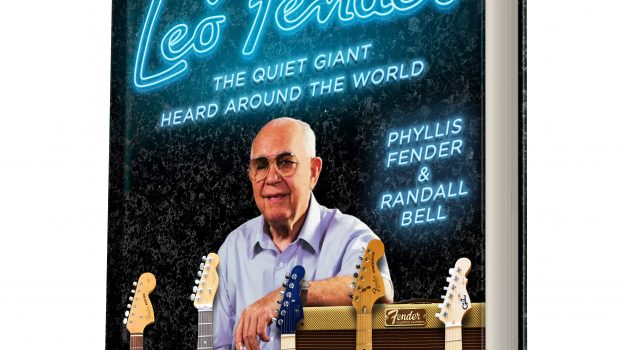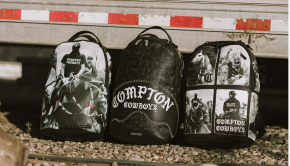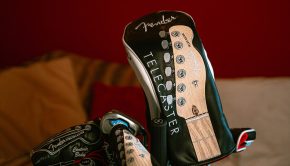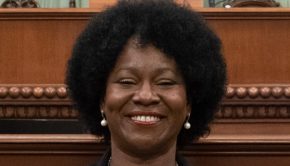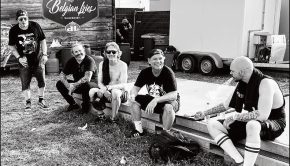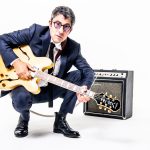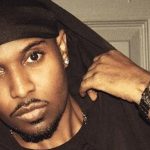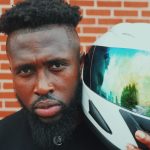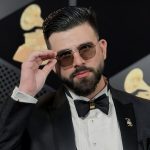Phyllis Fender & Dr. Randall Bell On “Leo Fender: The Quiet Giant Heard Around The World”
The way that we look at Thomas Edison lighting up the world via creating the lightbulb or Albert Einstein changing how we look at physics with E=MC2, Leo Fender can be credited for inventing the electric guitar. Played by the likes of Jimi Hendrix, Eric Clapton, John Mayer, Bob Dylan, and The Beatles’ George Harrison, the Fender Stratocaster was designed in 1954 by Leo Fender, Bill Carson, George Fullerton, and Freddie Tavares. The Fender Telecaster — also helmed in the 1950s — has been famously played by Johnny Cash, Tom Morello, Green Day’s Billie Joe Armstrong, The Police’s Andy Summers, Led Zeppelin’ Jimmy Page, Jack White, Kurt Cobain, and Paul McCartney. Not surprisingly, Mr. Fender is an inductee of the Rock & Roll Hall Of Fame, the Country Music Hall Of Fame, and the Rock Walk Of Fame; he was also the winner of a posthumous Technical Grammy Award.
Penned by Dr. Randall Bell — also author of Me We Do Be: The Four Cornerstones Of Success — and Fender’s wife Phyllis Fender, Leo Fender: The Quiet Giant Heard Around The World is a look at the life and career of Leo Fender. While the Fender brand is widely-known, the average person does not know much about Leo Fender. Known to be quirky, the inventor lived in a mobile home, even after selling his company for today’s equivalent of $300 million. I had the pleasure of speaking with both authors of Quiet Giant for The Hype Magazine, and highlights of the Q&A are below.
More info on the Leo Fender and his company can be found at www.fender.com, while the book penned by Phyllis Fender and Dr. Randall Bell is now available through your favorite book retailer.
How did you and Leo first meet?
Phyllis Fender: Leo was introduced to me by mutual friends George and Lucille Fullerton, who I knew from church. At the time, I had no idea Leo was famous, and in fact I did not realize he was famous until after we got married!
Did Leo and you ever play music together? Did he play much around the house?
Phyllis Fender: Leo could not play the guitar, and in fact he could not tune a guitar. He just loved to listen to music and he loved musicians.
How did you and Dr. Bell first meet?
Phyllis Fender: Randy’s dad worked at Fender for many years and his family lives a couple blocks from us. We met at the Fullerton Museum where I was giving a talk about Leo. Randy told me that he felt that these stories about Leo had to be recorded in a book, so the next Monday we met at Polly’s Pies, which has been a favorite place for both our families for many years. Polly’s is just up the street from the building where Leo invented the Stratocaster.
Your father was the head of the R&D department at Fender’s company. How long did he work with Fender?
Randall Bell: My dad worked with Fender for about 15 years. Leo opened the building about 1952, and my dad turned out all the lights and locked the door for the final time when the building closed in 1985, when Fender moved to Corona. My dad drove home and retired from his favorite job.
What was your first Fender-related memory?
Randall Bell: My dad started working at Fender when I was in junior high school. One day he came home from work and asked me to help him unload the car. My dad had the entire trunk filled with cut-away wood for Stratocasters and Telecasters. Leo hated any kind of waste and was happy when everything got used.
My dad and I stacked it to the ceiling in the garage and used it as firewood. It was alder and ash, which are very hard woods, and they would burn forever in our fireplace and at bonfires down at the beach. This became a ritual growing up. My dad loved the quality woods and brought home scraps and made all kinds of things, like doll houses for my nieces and later even my daughter.
My dad introduced me to every single person on the assembly line. For everyone, it was more than a job. They knew they were contributing to a huge revolution in music, and it was very cool. I was very proud of my dad.
What do you think makes Fender stand out from other guitar-related companies?
Randall Bell: Leo was the first, so he will stand out forever as the guy who made it happen. Growing up and even today, I have never met anyone who did not like the guy. From being born in a barn here in Fullerton, to becoming wildly rich and famous, he was always the same, calm, humble and genuine guy.
Leo set the tone. Freddie Tavares helped Leo invent the Stratocaster and he was the same way, a gentle, humble man. Freddie played at my sister’s wedding. Leo, Freddie and my dad all were engineers and had plastic pocket protectors. They would spend many hours with the smallest and biggest names in the music business and help them get just the vibe they wanted.
These guys had short hair and were conservative, and they were hanging out with acid rockers with hair down to the floor. It didn’t matter, if you were into music, they liked you. It was a beautiful connection. They got along with everyone and just wanted to bring more and more music into the world – even music they didn’t really get.
What was your collaboration process like on this book?
Phyllis Fender: Randy would come to the house once a week and pick me up, and then we would drive down to Polly’s and sit in our “office” which is a booth at the very back of the restaurant. I would usually order a wedge salad and Randy would get a turkey sandwich. We would talk for a while. Randy went to UCLA, so I would usually try and help him abandon his wicked ways and turn to USC, but I have had limited success.
They Randy would take out his cell phone and turn on the recorder and just start asking me about life with Leo. Randy read a lot of stuff about Leo, and of course he knew a lot from his dad growing up, so he would just ask lots and lots of questions. Randy would then take the recordings and get them transcribed, and bring them back to me the next week to read over and edit. This went on for months and months.
Some days, after our lunch, we would drive around Fullerton and look at the place where Leo was born, or go down to the old plant buildings and places where Leo liked to hang out. This would bring back more memories about what Leo was really like as a person. I love to talk and tell stories, and Randy likes to listen, so it all worked really well. I know what Leo was like behind the scenes in his home life and travels, and Randy knows all about guitars and the manufacturing, so we were the perfect team.
Do you have a favorite part of the book?
Phyllis Fender: I like all the silly stories. I think it’s funny how the world thinks about Leo as this workaholic inventor, and he certainly was a workaholic, but he was also a wonderful husband and he just loved the children and grandchildren. Leo had a lot of odd quirks that he never saw the humor in, so it was fun to share all of that.
What do you wish more people knew about Leo Fender? Do you feel there’s anything people have wrong about him?
Phyllis Fender: People know he was a great inventor and that he built a huge empire. They are right about that. I don’t know if they have anything wrong about him, it’s just that there are a lot of other dimensions to him, which we like to talk about in the book.
Randall Bell: Leo stands in stark contrast to other CEO’s in the world today. What CEO is prominent in every job in the plant? Leo would drop to the concrete floor to fix a machine before anyone. He was brilliant, but it never went to his head.
Book aside, what is coming up for you work-wise?
Phyllis Fender: We are going to do a documentary film on Leo Fender together. We going to start shooting in about two months.
When not busy with writing or work, how do you like to spend your free time?
Phyllis Fender: I love spending time with my three children and my wonderful grandchildren. I also love singing in choir at my church here in Fullerton and volunteering at the Fullerton Museum where they have a permanent Leo Fender wing. God has been very good to me, and I am very blessed with a wonderful family.
Randall Bell: I live and work by the beach, which I really enjoy with my family. I have a beautiful wife and four kids, and I love my friends and Church too. I volunteer with homeless, recovering addicts and in a prison-outreach program at San Quentin. I also am working on a second edition of my book, Me We Do Be: The Four Cornerstones Of Success.
Finally, any last words for the kids?
Phyllis Fender: Leo was born in a barn and quite poor, he had a glass eye and later lost most of his hearing. But he never got angry, stayed out of trouble, he worked hard at school and he was nice to everyone. Later, he became rich and famous, but he never showed off. He never thought that he was better than anybody else. He was kind of shy and quiet, and he just helped others. He felt that God wanted more music in the world, and his job was to help do this. That’s a good example that we can all learn from.
Randall Bell: Be yourself, treat everyone with kindness, and work together for more music. That is the true legacy of Leo Fender.
Tweet
